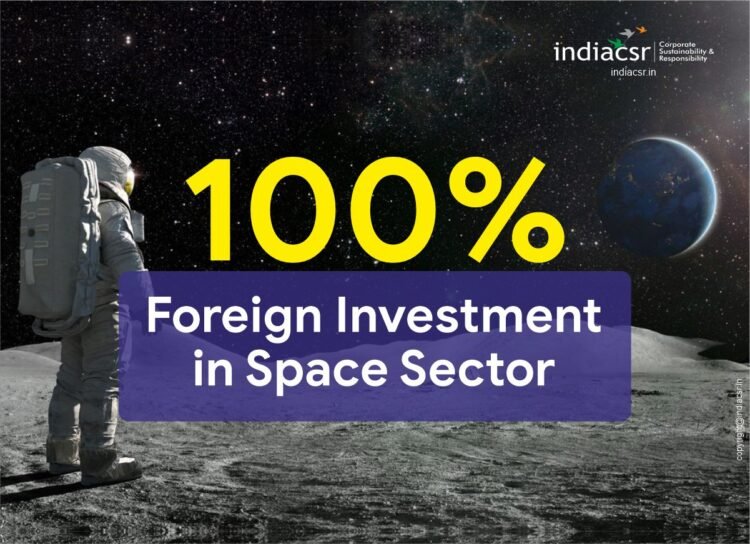India streamlines foreign investment by allowing 100% ownership in diverse sub-sectors and activities through an automated approval process.
A Bold Move to Attract Global Expertise and Accelerate Growth
NEW DELHI (India CSR): In a historic move, the Indian government has unveiled a revamped Foreign Direct Investment (FDI) policy for its space sector. This policy revision marks a significant shift, allowing up to 100% foreign investment in specific segments, paving the way for greater international collaboration and propelling India’s ambitions in the final frontier.
Previously, the Indian space sector, dominated by the Indian Space Research Organisation (ISRO), functioned largely under government control with limited opportunities for foreign participation. The revised policy sheds this restrictive approach, embracing the potential of foreign investment to unlock a multitude of benefits.
Key Highlights of the Revised Policy
- Increased FDI Caps: The policy revision significantly raises the FDI cap to 100% for specific activities within the space sector. This includes crucial areas like:
Satellite Manufacturing and Operation: Foreign companies can now invest fully in the end-to-end process of satellite development, launch, and management.
Launch Vehicles and Associated Systems: This opens doors for foreign investment in the development and production of rockets and related technologies critical for space exploration.
Creation of Spaceports: The policy paves the way for foreign companies to participate in building and operating space launch facilities within India.
Manufacturing of Components: This allows foreign companies to invest in the production of critical components for satellites, ground infrastructure, and user equipment.
- Streamlined Entry Routes: The revised policy introduces a two-tiered entry route system, simplifying the investment process:
Automatic Approval: Activities like manufacturing components and subsystems for the space sector can now receive automatic approval for FDI up to 100%, streamlining the process for foreign investors.
Government Approval: Certain activities, such as satellite manufacturing beyond 74% foreign ownership and launch vehicle development exceeding 49% foreign investment, will require government approval. This ensures national security concerns are addressed while fostering collaboration.
***

FDI in Space Sector: Key Changes
India’s new space policy, the Indian Space Policy 2023, takes a liberalized approach across various aspects of the space sector, offering investors attractive opportunities:
Manufacturing: 100% foreign direct investment (FDI) is allowed through an automatic route for companies looking to manufacture components, systems, or sub-systems related to satellites, ground segments, and user segments. This streamlined process reduces bureaucratic hurdles and encourages investment.
Satellite Operations: Companies can invest up to 74% through the automatic route for satellite manufacturing and operation. Any venture seeking higher FDI involvement will require government approval, ensuring a balance between openness and oversight.
Launch Vehicles and Spaceports: Similar to satellite operations, up to 49% FDI is allowed through the automatic route for launch vehicles and spaceports. Investments exceeding this limit will require government approval, emphasizing a cautious approach for these crucial sectors.
SPACE SECTOR
| Sector/Activity | Sectoral Cap | Entry Route |
| 5.2.12.1(1) Satellites-Manufacturing & Operation | 100% | Up to 74%: Automatic Beyond 74%: Government route |
| (2) Satellite Data Products | ||
| (3) Ground Segment & User Segment | ||
| 5.2.12.2(1) Launch Vehicles and associated systems or subsystems | 100% | Up to 49%: Automatic Beyond 49%: Government route |
| (2) Creation of Spaceports for launching and receiving Spacecraft | ||
| 5.2.12.3Manufacturing of components and systems/ sub-systems for satellites, ground segment and user segment | 100% | Up to 100%: Automatic |
***

Expected Impact and Benefits
The revised FDI policy is expected to have a transformative impact on the Indian space sector:
Boosting Innovation and Growth: Increased foreign investment will inject much-needed capital into the sector, fueling research and development, and accelerating technological advancements.
Creation of Jobs and Economic Growth: The influx of investment and expertise will create new job opportunities in various fields, contributing significantly to India’s economic growth and technological prowess.
Access to Advanced Technologies and Expertise: Collaboration with foreign companies will provide access to cutting-edge technologies and global expertise, propelling India’s capabilities in space exploration and applications.
Enhanced Global Collaboration: The revised policy fosters a more collaborative environment, enabling India to work alongside international players on space missions and ventures, fostering international partnerships and knowledge sharing.
By embracing international collaboration and expertise, India is poised to take a giant leap forward, not just in space exploration, but also in its journey towards becoming a global leader in the space economy.
***

Definitions
(1) Satellites — Manufacturing & Operation: End-to-end manufacturing and supply of satellite and/or payload, establishing the satellite systems including control of in-orbit operations of the satellite & payloads.
(2) Satellite Data Products: Reception, generation or dissemination of earth observation/remote sensing satellite data and data products including Application Interfaces (API).
(3) Ground Segment & User Segment:
(a) Ground Segment: Supply of satellite transmit/receive earth stations including earth observation data receive station, gateway, teleports, satellite Telemetry, Tracking and Command (TTC) station, Satellite Control Centre (SCC), etc.
(b) User Segment: Supply of user ground terminals for communicating with the satellite, which are not covered under the ground segment.
(4) Launch Vehicles and Associated Systems or Subsystems: A vehicle and its stages or components that is designed to operate in or place spacecraft with payloads or persons, in a suborbital trajectory, earth orbit or outer space.
(5) Creation of Spaceports for launching and receiving Spacecraft: A spaceport (also referred as launch site) can be regarded as the base from which spacecraft are launched, and consisting of facilities involving devices for transportation to, from and via outer space.
(6) Manufacturing of Components and Systems/Subsystems for Satellites ground segment and user segment: Comprises the manufacturing and supply of the electrical, electronic and mechanical components systems/ subsystems for satellites, ground segment and user segment.
“The above decision will take effect from the date of FEMA notification.”, the India government release said.
***

India’s Space Sector: Embracing Change for Global Growth
Following the global trend of increased private involvement and international collaboration in space exploration, India is making strategic moves to unlock its space sector’s potential.
Similar to the US, the European Union, and China, India’s new policy changes encourage private investments in areas like satellite development and space exploration. This aligns with the global trend of privatization in the space industry.
The expected outcome? A booming Indian space economy. Valued at around $8.4 billion in 2023, the sector aims to reach a staggering $44 billion by 2033, capturing a larger share of the global market. This ambitious goal is supported by a surge in space startups (from 1 in 2014 to 189 in 2023) and increased investments reaching $124.7 million in 2023.
But it’s not just about the money. By liberalizing FDI (Foreign Direct Investment), India is making a strategic move to:
- Align with global trends: This positions India as a competitive player on the international stage, fostering collaboration and innovation.
- Drive economic growth: The space sector holds immense potential for creating jobs and boosting the economy.
To facilitate smooth private sector participation, India established IN-SPACe, a dedicated agency. This agency acts as a bridge between the Indian Space Research Organisation (ISRO) and private companies, promoting and regulating their space endeavors. So far, IN-SPACe has signed 45 agreements with non-government entities, paving the way for inclusive growth.
The combined efforts of the new space policy and liberalized FDI policy are laying the groundwork for a vibrant space sector in India. This framework aims to:
- Enhance space capabilities: This includes developing cutting-edge technologies and fostering a skilled workforce.
- Stimulate commercial presence: Encouraging private companies to participate in space activities will drive innovation and economic growth.
- Leverage space technology for development: Space-based solutions can address various challenges in areas like agriculture, disaster management, and communication.
By embracing private sector involvement and fostering international partnerships, India is well-positioned to:
Boost its technological prowess: This will strengthen India’s position as a leading spacefaring nation.
Increase its economic footprint: The space sector holds immense potential for creating jobs and generating revenue.
This strategic shift towards a more open space sector marks a new era of growth, innovation, and collaboration. With a balanced approach to regulation and market freedom, India’s space sector is poised to take flight, contributing significantly to the global space community.
(India CSR)





















